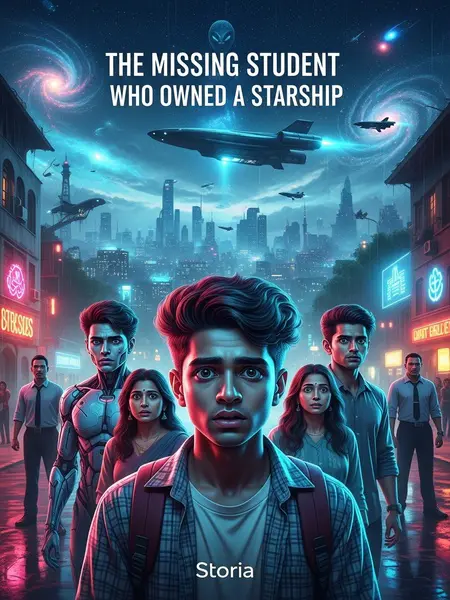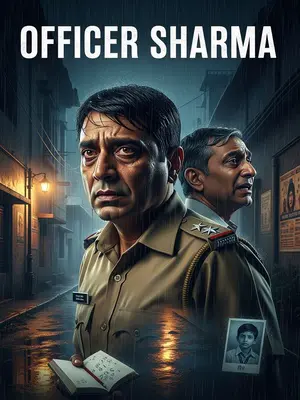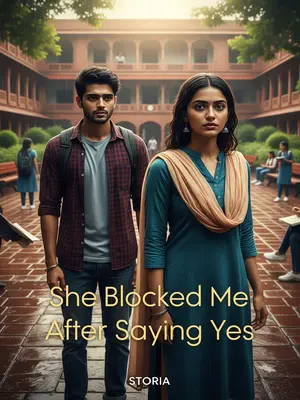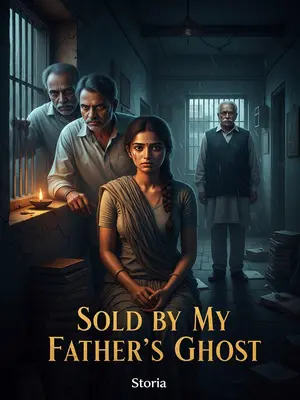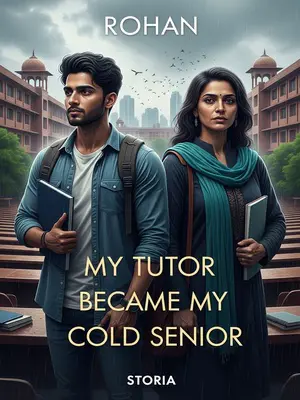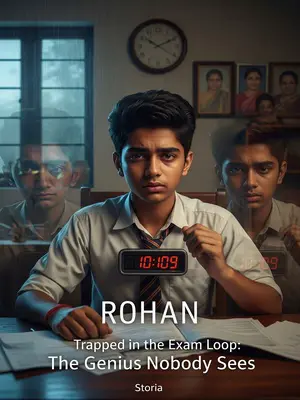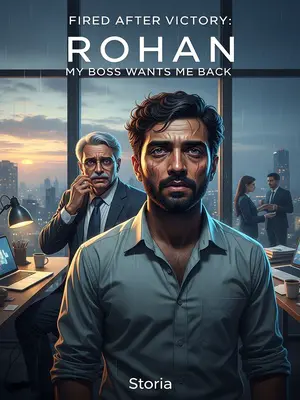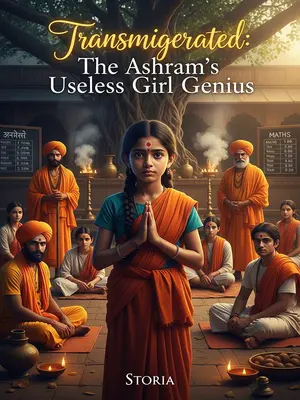Chapter 2: Descent and Demonstration
“Inspector saab, really... not even a clue?” Arjun’s mother’s haggard face was streaked with tears, her voice hoarse as she pleaded with the policeman. “My Arjun is sensible; he couldn’t have disappeared for no reason. Was he... kidnapped?”
She dabbed her eyes with her dupatta, clutching Arjun’s old school ID card, her hands trembling as she muttered a prayer under her breath. The room was stifling, the ceiling fan barely moving the heavy air.
The inspector softened his voice: “Aunty, we understand, but there’s no sign of kidnapping or ransom. CCTV shows Arjun leaving the hostel alone. We’re expanding the search and will notify you as soon as we have news.”
He called her 'Aunty'—the way Indian police do for comfort—and offered a cup of chai, which she accepted with shaking hands.
Arjun’s father stood silent, fists clenched, eyes red. His pride and helplessness battled, but he would never cry in front of strangers.
The counsellor and college authorities promised to cooperate, but hope faded as the days passed. Even the strict hostel warden looked worried. Rumours spread faster than WhatsApp forwards—black magic, secret societies, or maybe another case like 'last time when Rohan went missing after Holi.' The hostel WhatsApp group buzzed with memes and wild theories.
Meanwhile, in orbit above Neela Tara, the Prabhat glided like a celestial chariot sung in ancient hymns, beyond the reach of prayers or mortal eyes.
“Bionic human ‘Arjun-1’ manufactured: biological feature match 100%, neural connection synchronisation rate 100%.” Xingzhi’s voice sounded in Arjun’s mind.
The news felt momentous—a new birth. Arjun felt a strange awe; this wasn’t just survival, but legacy.
He stood before the life-support pod, watching the duplicate inside—his own face, peaceful in blue liquid. He pressed a palm to the glass, recalling stories of doppelgangers. Now, he had become his own.
He took a deep breath and, following Xingzhi’s instructions, lay in the adjacent neural pod.
As the liquid rose, he whispered, 'Hanumanji, raksha karna,' a habit from childhood clinging to him even amid alien technology.
Cold liquid filled his senses. His consciousness faded, then surged up—he opened his eyes, seeing through the pod glass. He glanced at his reflection, wondering if his mother would notice the difference, or if his friends would sense something off.
He flexed his fingers, feeling every sensation—the puppet and puppeteer at once. Bubbles rose; he watched, awed and unsettled.
“How does it... feel?” he asked, hearing his own voice—identical, yet not.
He cleared his throat instinctively, realising the habit meant nothing now.
“Neural connection normal, all sensory data transmission synchronisation rate 100%,” Xingzhi replied.
He tried a smile, remembering practicing it before class photos—now, every gesture was flawless.
He moved; the control was perfect, even more coordinated than his original body. It felt like wearing a perfectly tailored sherwani—everything fit.
“Xingzhi, make two more bionic humans. No need to fully simulate me—just basic templates. Set them as my assistants.”
He pictured his friends’ reactions: 'Bhai, you got your own bodyguards now?' and chuckled.
“Command confirmed: Starting manufacture of bionic humans ‘Assistant-A’, ‘Assistant-B’. Estimated 12 Neela Tara hours each.”
Alien machines whirred and hummed. Arjun marvelled at how he could now create companions, almost like ordering food online.
A day later, Arjun-1 and two assistants stood at the Chaya’s hatch—like the cast of a Bollywood sci-fi film. The assistants, bland-faced in generic kurtas, could blend into any small-town crowd.
“Xingzhi, set course. Return to Neela Tara, near the abandoned factory,” Arjun ordered.
He felt a surge of pride—he was no longer a pawn, but a player.
“Course set. Enable optical stealth and radar evasion?”
The old monkey-gun story flashed in his mind. He hesitated, recalling his dadi’s tales: sometimes, to claim a throne, you must announce your arrival.
“No, cancel stealth. Enter the atmosphere normally.”
He surprised himself with his own boldness—the kind reserved for cricket finals and rallies.
“Warning: Cancelling stealth will likely be detected by Neela Tara’s detection technology. Confirm execution?”
He knew there would be no lifelines. “Confirm execution.”
He stood tall, flanked by his silent assistants.
“Command received: Chaya departs. Estimated to enter Neela Tara’s atmosphere in 30 minutes.”
Almost instantly, air defence alarms blared worldwide—from Lucknow to Los Angeles. The world’s stage was set.
America, NORAD: “General, anomalous target in high orbit, moving fast, descending toward Neela Tara.”
“Origin? Ballistic missile?”
“No, unconventional trajectory—like an aircraft, but far faster.”
Bharat, National Space Monitoring Centre: “Unidentified target entering atmosphere, Mach 25, decelerating. Predict impact near Kaveripur City.”
Someone muttered a prayer. 'Alien' was whispered half-jokingly.
“Notify Kaveripur City Emergency Command. Evacuate civilians within five kilometres!”
The message spread faster than a local train. Phones buzzed, police and disaster teams leapt into action.
Russia, Japan, South Africa—every country with space monitoring saw the guest. Diplomats scrambled. Social media exploded. TV anchors screamed: 'UFO Sighting in Central India!' WhatsApp groups raced with rumours.
In Kaveripur, sirens wailed. Families packed steel utensils, sarees, and prasad, hurrying into the night. Children clung to mothers, elders grumbled about lost sleep, but everyone moved with the efficiency of those used to sudden emergencies.
Neighbours huddled, faces lit by mobile screens. Some prayed, some cursed, all waited for news.
Ten thousand metres above, Chaya’s fire trailed like Diwali rockets—a celestial chariot descending. Children pointed, adults muttered prayers.
The night was torn apart.
Somewhere, a dog howled at the sudden brightness. An old transistor radio sputtered with breaking news. For a few minutes, time froze.
Chaya landed with precision in the abandoned factory on Kaveripur’s outskirts. The earth shook, windows rattled, birds scattered. Dust rose in orange clouds.
The impact subsided, but engines still hummed when police sirens, army trucks, and military choppers converged. Powerful torches locked onto the craft, slicing the dust.
“All units, maintain distance, prepare firepower.”
Soldiers took position behind sandbags, weapons ready. Helicopters whipped fierce winds, searchlights fixed on Chaya’s hull. Gunpowder and fear hung in the air.
News channels went live. WhatsApp and Twitter trended #KaveripurUFO.
Chaya’s hatch hissed open. A hush fell—the kind before a miracle or disaster.
A figure stepped out, shielding his eyes, hand raised in peace. Not an alien, but a young man in jeans and kurta. Someone gasped, 'Yeh toh hamara hi ladka hai!'
It was Arjun—the missing college student.
More precisely, Arjun-1.
He walked with calm confidence, his spectacles glinting, a faint smile on his lips. Behind him, two assistants stood motionless.
“Don’t move! Hands up!” the lead officer shouted. Arjun-1 felt déjà vu, like being scolded by a strict teacher.
He complied, moving with perfect calm. His gaze swept over the crowd, reading fear, awe, confusion.
Technicians ran facial recognition—confirmation: Arjun, age 20, missing student.
The officer’s tone softened: “Please explain. Why are you here? Where did this craft come from?”
Arjun-1 replied, “It’s complicated. Simply, I had some... encounters.”
His voice was steady as a temple bell. “This craft, ‘Chaya’, does not belong to any country on Neela Tara.”
“Alien technology?”
“You could put it that way. As for its origin, I can’t say. The craft—and what’s behind it—are bound to me.”
“Bound?”
“A kind of permission binding. Only I can control it. I have no ill intent. I just want to go home.”
The simplicity of his request struck a chord. For a moment, the guns seemed less threatening.
The world reeled—alien tech, personal binding, uncrackable? Command centres buzzed with panic and awe.
“You mean, ‘Chaya’ is completely under your control?”
“Yes.”
America: “Analyse every word, assess credibility. Agents in Bharat—approach the target at all costs.”
Russia: “Science fiction or not, the craft is real. Did Bharat strike gold or find trouble?”
Japan: “Monitor. If Bharat acquires this tech...”
In Bharat, a white-haired elder ordered: “No escalation. Send an expert team. Notify Arjun’s parents—he’s safe, but the situation is special.”
Above the factory, helicopters eased off. Experts in suits approached the craft, detectors buzzing. Arjun-1 kept his hands up, assistants still as statues.
“Please come with us, along with your companions. We need to understand the situation,” the officer said gently.
“Okay,” Arjun-1 agreed, stepping forward. The assistants followed in perfect sync.
As commandos approached Chaya, a jolt threw one back—an electric shield flashed blue, the air thick with ozone. The crowd gasped. Guns swung back to Arjun-1.
He shrugged, “I didn’t do anything. I said, only I can control this ship.”
A faint smile, a trace of challenge: “Try if you want. But I suggest you don’t get close.”
Confusion reigned. The old man in the command centre ordered, “Cease all force. Express goodwill, cooperate.”
The officer pleaded, “We mean no offence. If you cooperate, we’ll help and protect you.”
“Help and protection?” Arjun-1 repeated, looking out at the crowd, history’s weight pressing on him.
“How about this.” He raised his right hand, snapping his fingers at a distant warehouse.
A crisp sound. For a moment, nothing. Then, a beam shot from Chaya—no explosion, no fire. The warehouse simply vanished, erased from existence.
Silence. Not even insects dared breathe.
Somewhere, a soldier made a sign to ward off evil, another whispered, 'Ram naam satya hai.'
“This... is the demonstration.” Arjun-1 said blandly.
Somewhere in the crowd, a child whispered, “Is he a god or a demon?” But Arjun-1 just stood there, waiting for the world to decide.
